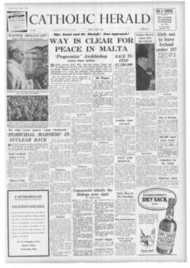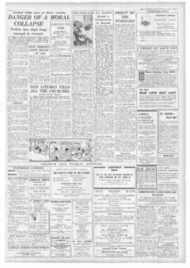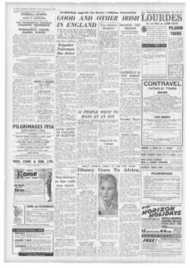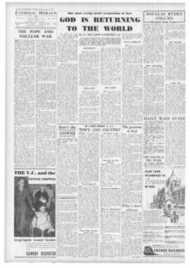Page 6, 6th April 1956
Page 6
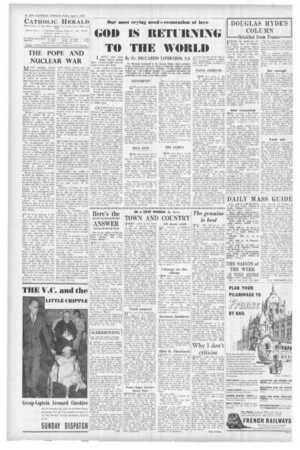
Report an error
Noticed an error on this page?If you've noticed an error in this article please click here to report it.
Tags
Share
Related articles
The Bomb And Us
The Bomb And Us
Is Modern War Unjust?
The Lesson Is Simple: 'love Your Enemy'
Why Did They March?
THE POPE AND NUCLEAR WAR
ANY thinking people must have felt during and since the last war that attempts to apply the traditional canons of justice in warfare were becoming more and more difficult. This difficulty has led to discussions on the subject becoming hardly more than an academic matter.
The emergence of nuclear armaments has increased still more the difficulty, and this just at the moment when men are realising ever more clearly that any future war on a world scale must certainly end civilisation as we know it.
Recently a medieval disputation on whether the use of nuclear weapons is morally permissible has been held under Dominican auspices, and the text of the disputation has been made available through " Blackfriars." It is of particular interest because readers must find it hard to find flaws in the close areasoning which leads to the conclusion that nuclear warfare is intrinsically immoral.
Yet, paradoxically, this very fact seems to lend to the whole issue a further air of unreality and irrelevance. It is not quite the same as fiddling while Rome burns, but one is reminded of that precedent because in fact it seems unthinkable that mankind, and even the major section of Catholic mankind, is going to change its political habits because of a logical conclusion, however unanswerable.
We do not pretend to be able to solve the dilemma thus presented when logic clearly says one thing and the facts of life dictate the opposite. But at least it seems clear that it is not much use to anyone to remain suspended, as it were, in the dilemma and consequently passive in the face of the greatest practical problem of our day.
In this situation, all of us, whether we temperamentally incline to logic or to the facts, can take heart from the best practical lead of all, the lead of the Holy Father.
TN his Easter message to the
world, the Pope has once more stressed the one practical and fruitful solution. namely to check the race " towards the abyss " by common action between the nations and a policy which makes progressive disarmament, especially of nuclear and atomic weapons, possible, yet as we read his words, we hear of further nuclear tests, better and bigger than ever, which have taken place or are about to take place.
Surely it would be a good thing if the Catholics of the world, instead of racking their brains over the ultimate moral issue of nuclear warfare, put their weight solidly behind the practical work of limiting the use of nuclear energy for purposes of war and fostering its use for purposes of peace, as the Holy Father has just emphasised.
Here. in this country we have an obvious example. Can one really say that even in terms of world politics Britain needs to join in the nuclear race at all? Is not our present policy of making and testing major nuclear weapons based on an outdated sense of prestige rather than on a sober calculation of the potential value to us and to the world of an effort which helps to cripple us financially and which simply adds to the suicidal armaments race?
The deterrent value of British nuclear weapons must be relatively small, even in regard to the protection of our own interests, so long as peace is maintained, while in conditions of world nuclear war, Britain's survival value is anyway practically nil.
This is just an example where the Catholics and Christians of one country, if they supported this cause together could play an effective part in the disarmament battle, and our example could encourage Christians elsewhere to find appropriate ways and means of furthering the same end.
NO doubt there is much more to it than this. As the Pope made clear in his Christmas message, the political climate has to be such as to permit of real disarmament progress. In his Easter message he has reminded us of the difficulty of dealing with the infinitely adaptable policy of Communism which can assume so many hues in its effort to deceive the world and gain its end.
Nevertheless the world is faced with the alternative of finding a inodus vivendi within the present balance of power or the horrors of nuclear war. Rigidity on our part cannot he the answer.
However conscious we may be that we have essential right on our side and that there are principles which we cannot betray, we must also acquire the humility to recognise the enormous change in the world since the days of Anglo-American and European supremacy of power and secular culture.
Here, too, Catholics and Christians have an enormous contribution to make in insisting on the spiritual and moral fundamental equality of every human being and in recognising that much of the present intransigence of non-Europeans and non-Americans is but an imitation of our own superior attitude in the past.
We must rid ourselves of our consciousness of being better than others, while rightly holding on to the free gift we have received of spiritual, moral and cultural Vallics in so far, hut only in so Jar, as they stem from the teaching and revelation of Christ Our Lord.
In other words, we shall easily see, if we look at the whole picture with truly Christian eyes, that there is plenty for us to do towards promoting disarmament and conditions of peace without merely harping on the negative ideal of anti-Communism and our seemingly insoluble scruples about the rightness or wrongness of nuclear warfare.
blog comments powered by Disqus


